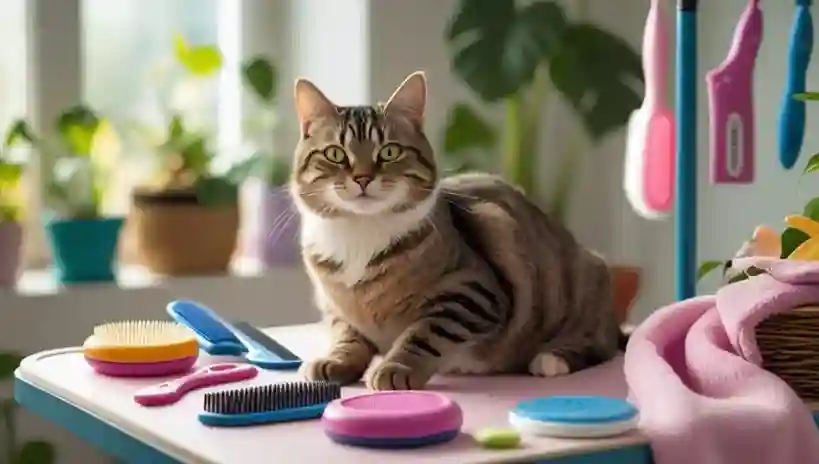Cats are curious creatures, often eyeing our plates with interest, especially when vibrant, nutrient-packed foods like sweet potatoes are involved. As a pet owner, you might wonder, Can cats eat sweet potatoes?
This comprehensive guide explores the safety, benefits, risks, and proper ways to incorporate sweet potatoes into your cat’s diet, ensuring their health and happiness. We’ll also address common questions, provide practical feeding tips, and recommend cat-safe products available on Amazon to complement their nutrition.
Understanding Sweet Potatoes and Feline Nutrition
Sweet potatoes are a staple in many human diets, celebrated for their rich nutritional profile, including vitamins A, C, and B6, fiber, and antioxidants. But can cats eat sweet potatoes and derive similar benefits? Cats are obligate carnivores, meaning their primary nutritional needs are met through animal-based proteins. While they don’t require vegetables like humans do, certain plant-based foods, such as sweet potatoes, can be safe and beneficial in moderation.
Unlike regular potatoes, which contain solanine—a compound toxic to cats—sweet potatoes are free of this harmful substance, making them a safer option when prepared correctly. However, their inclusion in a cat’s diet must be carefully managed to avoid digestive issues or nutritional imbalances. Let’s dive into the details of whether cats can eat sweet potatoes and how to offer them responsibly.
Are Sweet Potatoes Safe for Cats?
The short answer is yes, Can Cats Eat Sweet Potatoes in small, properly prepared amounts. According to veterinary sources, sweet potatoes are non-toxic to cats and can provide certain health benefits when given as an occasional treat. However, they should never replace the high-quality, protein-rich cat food that forms the foundation of a feline’s diet.
Why Sweet Potatoes Are Safe
Sweet potatoes lack solanine, unlike white potatoes, which makes them safe for feline consumption when cooked and served plain. They are rich in fiber, which can aid digestion, and contain vitamins that support overall health. For example, Vitamin A promotes healthy vision, skin, and coat, while Vitamin C offers antioxidant properties to boost immunity.
Risks of Feeding Sweet Potatoes to Cats
While Can Cats Eat Sweet Potatoes, there are risks to consider:
- Overfeeding: Too much sweet potato can lead to digestive upset, such as diarrhea or nausea, due to its high fiber content.
- Raw Sweet Potatoes: Raw sweet potatoes are tough for cats to chew and digest, posing a choking hazard and potential gastrointestinal issues.
- Seasonings and Additives: Human-prepared sweet potatoes often contain salt, butter, oils, or spices like garlic and onion, which are toxic to cats.
- Nutritional Imbalance: Cats need animal-based proteins, and excessive plant-based foods can reduce their intake of essential nutrients.
To mitigate these risks, always serve sweet potatoes plain, cooked, and in moderation—ideally no more than 5-10% of your cat’s daily food intake, or about 1-2 tablespoons per serving.
Health Benefits of Sweet Potatoes for Cats
When considering can cats eat sweet potatoes, it’s worth exploring their potential benefits. While not a necessary component of a cat’s diet, sweet potatoes can offer supplemental nutrition when fed sparingly. Here are some key benefits:
Digestive Health
The fiber in sweet potatoes can help regulate digestion, relieving constipation in cats. This is particularly useful for cats prone to hairballs or irregular bowel movements.
Satiety and Weight Management
Sweet potatoes contain complex carbohydrates that digest slowly, helping cats feel full longer. This can be beneficial for overweight cats on a vet-approved diet plan, as it may reduce begging behavior between meals.
Vitamins and Antioxidants
- Vitamin A: Supports healthy vision, skin, and coat.
- Vitamin C: Provides antioxidant properties to boost the immune system.
- Vitamin B6: Aids in protein metabolism and neurotransmitter production, supporting neurological health.
- Antioxidants: Compounds like beta-carotene and anthocyanins (found in purple sweet potatoes) may reduce inflammation and support long-term health.
Low-Calorie Treat Option
Compared to starchy vegetables like corn or peas, sweet potatoes are relatively low in calories, making them a suitable occasional treat for cats.
How to Safely Feed Sweet Potatoes to Your Cat
If you’re convinced that Can Cats Eat Sweet Potatoes and want to offer them as a treat, preparation is key. Follow these steps to ensure safety and maximize benefits:
Step 1: Choose the Right Sweet Potato
Opt for fresh, organic sweet potatoes to avoid pesticides or additives. Orange, purple, yellow, or white varieties are all safe, though orange sweet potatoes are most common and rich in beta-carotene.
Step 2: Cook Thoroughly
Raw sweet potatoes are difficult for cats to digest and may pose a choking risk. Use one of these cat-safe cooking methods:
- Boiling: Boil sweet potatoes for 15-20 minutes until soft, then mash them.
- Baking: Preheat your oven to 350°F, slice sweet potatoes into thin pieces (1/8- to 1/4-inch thick), and bake for 2-3 hours for a dehydrated treat.
- Steaming: Steam sweet potatoes until tender, then mash or cut into small pieces.
Avoid frying, as oils and fats can cause digestive issues. Never add salt, butter, spices, or sweeteners.
Step 3: Serve in Moderation
Offer a small portion—1-2 tablespoons of mashed sweet potato or a few small pieces—as an occasional treat. Mix it with your cat’s regular food or a cat-safe broth to enhance palatability. For example, combine mashed sweet potato with unsalted canned tuna water for a tasty treat.
Step 4: Monitor Your Cat
After introducing sweet potatoes, watch for signs of digestive upset, such as vomiting, diarrhea, or lethargy. If any symptoms occur, discontinue feeding and consult your veterinarian.
Creative Ways to Incorporate Sweet Potatoes
Here are some vet-approved recipes to make sweet potatoes appealing to your cat:
Mashed Sweet Potato and Tuna Treat
- Ingredients: 1-2 tablespoons mashed sweet potato (plain, cooked, peeled), 1 tablespoon unsalted canned tuna (in water).
- Instructions: Mix the mashed sweet potato with tuna water or small tuna flakes. Serve in a small bowl as a treat.
Baked Sweet Potato Bites
- Ingredients: 1 small sweet potato.
- Instructions: Slice into thin rounds, bake at 175°F for 2-3 hours until dehydrated, and break into small, cat-sized pieces.
These recipes ensure that Can Cats Eat Sweet Potatoes in a way that’s both safe and enjoyable.
Recommended Products for Cat Nutrition
To complement a balanced diet and occasional treats like sweet potatoes, consider these cat-safe products available on Amazon:
- Weruva Cat Food, Paw Lickin’ Chicken (Shop on Amazon): A high-protein, grain-free wet food to meet your cat’s carnivorous needs.
- Temptations Classic Crunchy and Soft Cat Treats (Shop on Amazon): A low-calorie treat option for variety, free of harmful additives.
- PetSafe SlimCat Interactive Toy and Food Dispenser (Shop on Amazon): A fun way to dispense small amounts of sweet potato treats, promoting mental stimulation.
Always check with your vet before introducing new foods or products to ensure they suit your cat’s specific health needs.
FAQs About Can Cats Eat Sweet Potatoes?
Based on Google Trends and common questions, here are answers to frequently asked questions about whether Can Cats Eat Sweet Potatoes:
Can Cats Eat Raw Sweet Potatoes?
No, raw sweet potatoes should not be fed to cats. They are hard to chew, pose a choking hazard, and can cause digestive upset. Always cook sweet potatoes thoroughly before offering them to your cat.
Are Sweet Potato Skins Safe for Cats?
No, sweet potato skins are highly fibrous and difficult for cats to digest, potentially leading to nausea or diarrhea. Always peel sweet potatoes before feeding them to your cat.
Can Cats Eat Sweet Potato Fries?
No, sweet potato fries are unsafe for cats. They are often seasoned with salt, oils, or spices, which can cause dehydration, digestive issues, or toxicity. Stick to plain, cooked sweet potatoes.
How Often Can I Feed My Cat Sweet Potatoes?
Sweet potatoes should be an occasional treat, not a daily food. Limit servings to 1-2 tablespoons, no more than once or twice a week, to avoid nutritional imbalances or digestive issues.
Do Sweet Potatoes Help with Cat Hairballs?
The fiber in sweet potatoes can aid digestion and may help reduce hairballs by promoting regular bowel movements. However, consult your vet for tailored advice on hairball management.
Are Purple Sweet Potatoes Safe for Cats?
Yes, purple sweet potatoes are safe for cats when cooked and served plain. They offer similar benefits to orange sweet potatoes, with added antioxidants like anthocyanins.
Tips for Optimizing Your Cat’s Diet
When exploring can cats eat sweet potatoes, it’s essential to prioritize a balanced, protein-rich diet. Here are additional tips to keep your cat healthy:
- Choose High-Quality Cat Food: Opt for vet-recommended brands like Hill’s Science Diet or Royal Canin, which provide complete nutrition.
- Consult Your Vet: Before adding sweet potatoes or other human foods, check with your veterinarian, especially if your cat has health conditions like diabetes or obesity.
- Monitor Treat Intake: Treats, including sweet potatoes, should not exceed 10% of your cat’s daily caloric intake.
- Introduce Gradually: Start with a small amount of sweet potato to gauge your cat’s reaction and prevent digestive upset.
Why Sweet Potatoes Aren’t a Substitute for Cat Food
While Can Cats Eat Sweet Potatoes as a treat, they cannot replace commercial cat food. Cats require taurine, an amino acid found in animal proteins, which is absent in sweet potatoes. A lack of taurine can lead to serious health issues, including heart disease and vision problems. Sweet potatoes should complement, not compete with, a cat’s primary diet.
Conclusion
In summary, Can Cats Eat Sweet Potatoes when prepared properly and offered in moderation. These nutrient-rich vegetables can provide fiber, vitamins, and antioxidants as an occasional treat, but they must be cooked, peeled, and free of additives. By following the guidelines in this article, you can safely introduce sweet potatoes to your cat’s diet while ensuring their nutritional needs are met through high-quality cat food.
For cat owners looking to diversify their pet’s treats, sweet potatoes can be a fun and healthy option when used sparingly. Always prioritize your cat’s health by consulting a veterinarian and monitoring their response to new foods. With the right approach, you can keep your feline friend happy, healthy, and curious about their next treat!
Sources:



